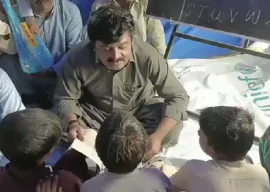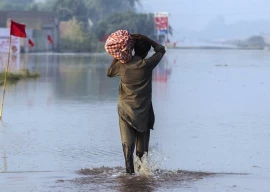
“We do not have electricity in our village yet but we’ve heard that they will be supplying it to us very soon,” said the 25-year-old woman excitedly, “That’s why we’re taking the fan with us. It works really well!”
The couple and their four children were among the 250 people who left the relief camp at the Hasan Lashari Educational Complex in Gizri on Saturday to get back to their homes in interior Sindh.
They left in two vehicles arranged by volunteers and camp management. Their luggage consisted of blankets, food and other basic necessities that had been given to them by the administration.
While the adults gathered their few belongings, the children at the camp crowded around the buses, peeking out of the windows and climbing the roofs in barely suppressed excitement.
Sumbal too cannot hide her happiness at going back. “I will drain out the dirty water and mud from my home and we will start living in it immediately. It does not matter what condition it is in.”
She knows the job of rehabilitation and reconstruction will be difficult but she feels that they can simply not leave their homes to the “mercy of the callous waters” anymore.
She and her husband have collected some basic commodities from Karachi to use when they arrive home.
“I got some brooms to clean up the house,” Sumbal said, “They’re really good [quality]. We also got blankets.”
Her family had been in Karachi for a little over a month. Irfan managed to find work on a daily-wage basis in the city and by now, they had saved “enough money to last for some time in the village”.
But while Irfan went out and made hard-earned money in the metropolis, Sumbal and her daughters spent their days in the camp. “We have been staying in this room since we came here. That is why we don’t know much about Karachi,” Sumbal said.
The sprawling city of Karachi still remains a place where they hope to visit later. “I will ask my husband to bring us here when our homes have been rebuilt and we have enough money,” she said. Her husband is the tenet of a feudal back home.
But whatever Karachi has to offer, Sumbal feels that it could never match their life back in the village that she hopes to resume very soon.
“We had two goats, six buffalos and two cows still alive when we left,” she said, adding that she hoped they would still be alive when they return. The only regret Sumbal took with her was that the government did not provide them with Watan cards or any kind of monetary compensation.
Around 850 people were living in the camp and the local administration said that more than half of them will leave for their homes very soon since the water level in their towns has receded.
“The rest of the people living here will leave whenever they want,” in charge of the camp Mukhtiar Ahmad told The Express Tribune.
According to him, all people left for their homes voluntarily.
More than 50,000 people migrated to Karachi after the floods. While some of them found shelter with their relatives, most of them were accommodated in more than 20 relief camps set up across the city.
Published in The Express Tribune, September 26th, 2010.



1724406196-0/BeFunky-collage]_____-(87)1724406196-0-165x106.webp)













COMMENTS
Comments are moderated and generally will be posted if they are on-topic and not abusive.
For more information, please see our Comments FAQ